Ubuntu Linux Compatible WiFi USB Adapters
This article was last edited over 3 years ago. Information here may no longer be accurate. Please proceed with caution, and feel free to contact me.
First, Consider Tethering
As pointed out by @roland in the comments you may find that the easiest, cheapest, fastest, and most reliable way to get a USB WiFi connection on your Linux box is by using USB tethering with your smartphone.
This is possible natively in Android. It is not possible with iOS unless iOS is jailbroken. iOS can share its cellular connection over USB natively, but not its WiFi connection unless it is jailbroken.
A Raspberry Pi 3 B+ (which supports 802.11ac 5Ghz) can also be used to accomplish a similar result, but using ethernet rather than USB.
I recommend considering some form of tethering before buying a USB WiFi device for the reasons explained below. Generally speaking, USB WiFi in Linux is a tricky thing to get right.
Linux WiFi Warnings
Read the Introduction in the Debian WiFi article before diving into Linux and USB WiFi devices. Also, feel free to read about my own experiences on this topic. I rewrote this article after a helpful commenter pointed out how problematic it is to recommend USB WiFi devices for Linux. Most manufacturers do not play well with Linux, with some notable exceptions.
Ever wonder some Amazon reviews have conflicting reports about Linux support? Read those articles I just listed! It is almost impossible to know which chipset one will receive when buying most USB WiFi devices except when buying 🐧 ThinkPenguin device.
I understand that ThinkPenguin devices may not be ideal for everyone. I am listing other, non-ThinkPenguin devices, that I have tested. However, for the reasons I stated above, it is a gamble whether or not they will work for everyone. ThinkPenguin devices are a much simpler option for Linux. Unfortunately, ThinkPenguin devices lack 802.11ac support and are a bit more expensive.
You are responsible for your own purchasing decisions and I make no guarantees!
Devices Tested
- TPE-N150USB - Great for Linux 🐧
- TPE-N150USBL - Great for Linux 🐧
- EW-7811UTC - Works with 802.11ac
- PAU06 - Cheap, but less reliable
- PAU05 - Cheap, but less reliable
This is not an exhaustive list. I have not purchased hundreds of cards. I have purchased several cards, and am ranking only the cards I own. As an average Linux user, I will do the best I can to relate what I found so that it may help others.
All cards were tested using Ubuntu 16.04.3 LTS Xenial Xerus
4.10.0-37-generic #41~16.04.1-Ubuntu SMP Fri Oct 6 22:42:59
UTC 2017
against a server running iperf 3.0.11. Each test was performed
over a period of 4 hours. See
my wifi-testing repo
if you are interested.
TPE-N150USB - Great for Linux
Penguin Wireless N USB Adapter for GNU / Linux (TPE-N150USB)
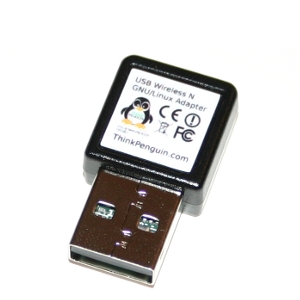
Chipset: AR9271
Driver: ath9k_htc
0cf3:9271 Qualcomm Atheros Communications AR9271 802.11n
The TPE-N150USB performed very reliably in my tests. Download
speeds averaged 31.16 Mbps and upload speeds averaged
11.58 Mbps. The max speeds never topped
40.0 Mbps, but I found that the overall consistency
in performance was stellar.
From the research I have done, I would say this is going to be the most reliable Linux supported mini USB WiFi networking interface a consumer can except to find.
This card is supported by the Linux Kernel, which means that no special intervention is required to get this NIC to work. Just plug it in. It also supports Monitor mode, which is great for security analysis. Since ThinkPenguin uses reliable chipsets we can have confidence that we will receive the chipset that was advertised.
This card is my favorite considering the size, performance consistency, and Linux support.
Download Tests
0.0 - 3.3 Mbps | 0
3.3 - 6.7 Mbps | 4
6.7 - 10.0 Mbps | 8
10.0 - 13.3 Mbps | 6
13.3 - 16.7 Mbps | 10
16.7 - 20.0 Mbps | 2
20.0 - 23.3 Mbps | 0
23.3 - 26.7 Mbps | 2
26.7 - 30.0 Mbps | 58 +++++
30.0 - 33.3 Mbps | 325 ++++++++++++++++++++++++++++++
33.3 - 36.7 Mbps | 152 ++++++++++++++
36.7 - 40.0 Mbps | 3
40.0 - 43.3 Mbps | 0
43.3 - 46.7 Mbps | 0
46.7 - 50.0 Mbps | 0
total: 570
max: 37.0923 Mbps
min: 5.70558 Mbps
average: 31.16 Mbps
Upload Tests
0.0 - 3.3 Mbps | 5
3.3 - 6.7 Mbps | 28 ++
6.7 - 10.0 Mbps | 53 ++++
10.0 - 13.3 Mbps | 362 ++++++++++++++++++++++++++++++
13.3 - 16.7 Mbps | 122 ++++++++++
16.7 - 20.0 Mbps | 1
20.0 - 23.3 Mbps | 0
23.3 - 26.7 Mbps | 0
26.7 - 30.0 Mbps | 0
30.0 - 33.3 Mbps | 0
33.3 - 36.7 Mbps | 0
36.7 - 40.0 Mbps | 0
40.0 - 43.3 Mbps | 0
43.3 - 46.7 Mbps | 0
46.7 - 50.0 Mbps | 0
total: 571
max: 17.9236 Mbps
min: 2.44766 Mbps
average: 11.58 Mbps
TPE-N150USBL - Great for Linux
Penguin Wireless N USB Adapter /w External Antenna for GNU / Linux (TPE-N150USBL)
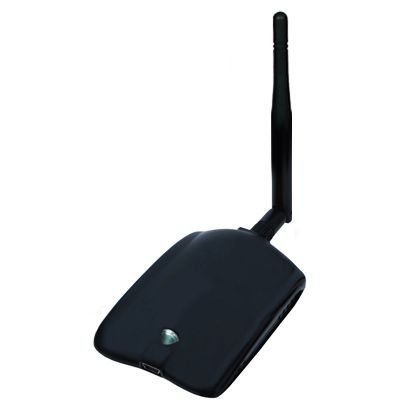
Chipset: AR9271
Driver: ath9k_htc
0cf3:9271 Qualcomm Atheros Communications AR9271 802.11n
The TPE-N150USBL performed very reliably in my tests. Download
speeds averaged 32.25 Mbps and upload speeds averaged
17.35 Mbps. The max speeds never topped
40.0 Mbps, but I found that the overall consistency
in performance was stellar.
This card seems to be almost identical to the TPE-N150USB. Both cards use the same chipset, same vendor ids, same product ids, and had almost identical performance statistics. This card was a tad faster, but it seems the difference in speeds is very slight. The external antenna on the TPE-N150USBL did not make much difference in testing. In my opinion, this card is not worth the additional cost compared to the TPE-N150USB.
This card is supported by the Linux Kernel, which means that no special intervention is required to get this NIC to work. Just plug it in. It also supports Monitor mode, which is great for security analysis. Since ThinkPenguin uses reliable chipsets we can have confidence that we will receive the chipset that was advertised.
Download Tests
0.0 - 3.3 Mbps | 0
3.3 - 6.7 Mbps | 3
6.7 - 10.0 Mbps | 8
10.0 - 13.3 Mbps | 7
13.3 - 16.7 Mbps | 7
16.7 - 20.0 Mbps | 7
20.0 - 23.3 Mbps | 3
23.3 - 26.7 Mbps | 4
26.7 - 30.0 Mbps | 16
30.0 - 33.3 Mbps | 176 +++++
33.3 - 36.7 Mbps | 305 ++++++++++
36.7 - 40.0 Mbps | 31 +
40.0 - 43.3 Mbps | 0
43.3 - 46.7 Mbps | 0
46.7 - 50.0 Mbps | 0
total: 567
max: 38.28 Mbps
min: 5.35 Mbps
average: 32.52 Mbps
sucess: 567
errors: 0
Upload Tests
0.0 - 3.3 Mbps | 0
3.3 - 6.7 Mbps | 16
6.7 - 10.0 Mbps | 11
10.0 - 13.3 Mbps | 4
13.3 - 16.7 Mbps | 55 +
16.7 - 20.0 Mbps | 459 ++++++++++
20.0 - 23.3 Mbps | 22
23.3 - 26.7 Mbps | 0
26.7 - 30.0 Mbps | 0
30.0 - 33.3 Mbps | 0
33.3 - 36.7 Mbps | 0
36.7 - 40.0 Mbps | 0
40.0 - 43.3 Mbps | 0
43.3 - 46.7 Mbps | 0
46.7 - 50.0 Mbps | 0
total: 567
max: 21.39 Mbps
min: 4.25 Mbps
average: 17.35 Mbps
sucess: 567
errors: 0
EW-7811UTC - Works with 802.11ac
Edimax EW-7811UTC AC600 Dual-Band
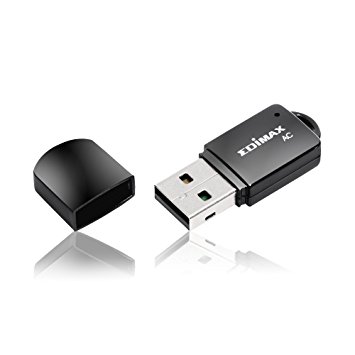
Potential Chipsets: RTL8811AU
Potential Drivers: scrivy/rtl8812au, diederikdehaas/rtl8812AU, gordboy/rtl8812au, abperiasamy/rtl8812AU_8821AU_linux, gnab/rtl8812au, sloretz/rtl8811au, Edimax, rtl8812au-dkms
7392:a812 Edimax Technology Co., Ltd
Getting this device to work on Linux was complicated. There are multiple drivers by multiple authors for this chipset. None of these linked drivers worked for me.
I tried multiple variations of the official Edimax driver code, but none of the Edimax drivers built successfully for me, and I did not want to spend time debugging their build scripts.
I found that the Ubuntu package for this driver would not build on my (vanilla) Ubuntu install either.
This article finally helped me find a working driver. For me, the working driver was the rtl8812AU_8821AU_linux driver by scrivy.
Once working, this card seemed
blazing fast (relative to other Linux WiFi
adapters that I tested) for me on Ubuntu 16.04.3. The performance
boost came from 802.11ac. With 802.11ac I saw download speeds
average 64.16 Mbps and upload speeds average
59.42 Mbps.
Overall, the performance of this card seemed very reliable for me.
Please note this is clearly not a well supported device on Linux, there are risks in downloading software from random repos, there are multiple versions of this device sold by Edimax, I only tested on Ubuntu, others may well receive a different chipset that I did, and there is no guarantee this card will work for everyone.
This is the only 802.11ac card I tested. Speeds are all for my 802.11ac network.
Download Tests
0.0 - 6.0 Mbps | 0
6.0 - 12.0 Mbps | 0
12.0 - 18.0 Mbps | 1
18.0 - 24.0 Mbps | 0
24.0 - 30.0 Mbps | 0
30.0 - 36.0 Mbps | 0
36.0 - 42.0 Mbps | 0
42.0 - 48.0 Mbps | 0
48.0 - 54.0 Mbps | 2
54.0 - 60.0 Mbps | 125 +++++++++++++++++++
60.0 - 66.0 Mbps | 190 ++++++++++++++++++++++++++++++
66.0 - 72.0 Mbps | 171 +++++++++++++++++++++++++++
72.0 - 78.0 Mbps | 35 +++++
78.0 - 84.0 Mbps | 0
84.0 - 90.0 Mbps | 0
total: 524
max: 75.8806 Mbps
min: 15.0154 Mbps
average: 64.16 Mbps
Upload Tests
0.0 - 6.0 Mbps | 0
6.0 - 12.0 Mbps | 0
12.0 - 18.0 Mbps | 0
18.0 - 24.0 Mbps | 0
24.0 - 30.0 Mbps | 0
30.0 - 36.0 Mbps | 0
36.0 - 42.0 Mbps | 0
42.0 - 48.0 Mbps | 0
48.0 - 54.0 Mbps | 4
54.0 - 60.0 Mbps | 259 +++++++++++++++++++++++++++++
60.0 - 66.0 Mbps | 261 ++++++++++++++++++++++++++++++
66.0 - 72.0 Mbps | 0
72.0 - 78.0 Mbps | 0
78.0 - 84.0 Mbps | 0
84.0 - 90.0 Mbps | 0
total: 524
max: 63.3158 Mbps
min: 50.9182 Mbps
average: 59.42 Mbps
PAU06 Cheap, But Less Reliable
Panda Wireless PAU06 300Mbps N
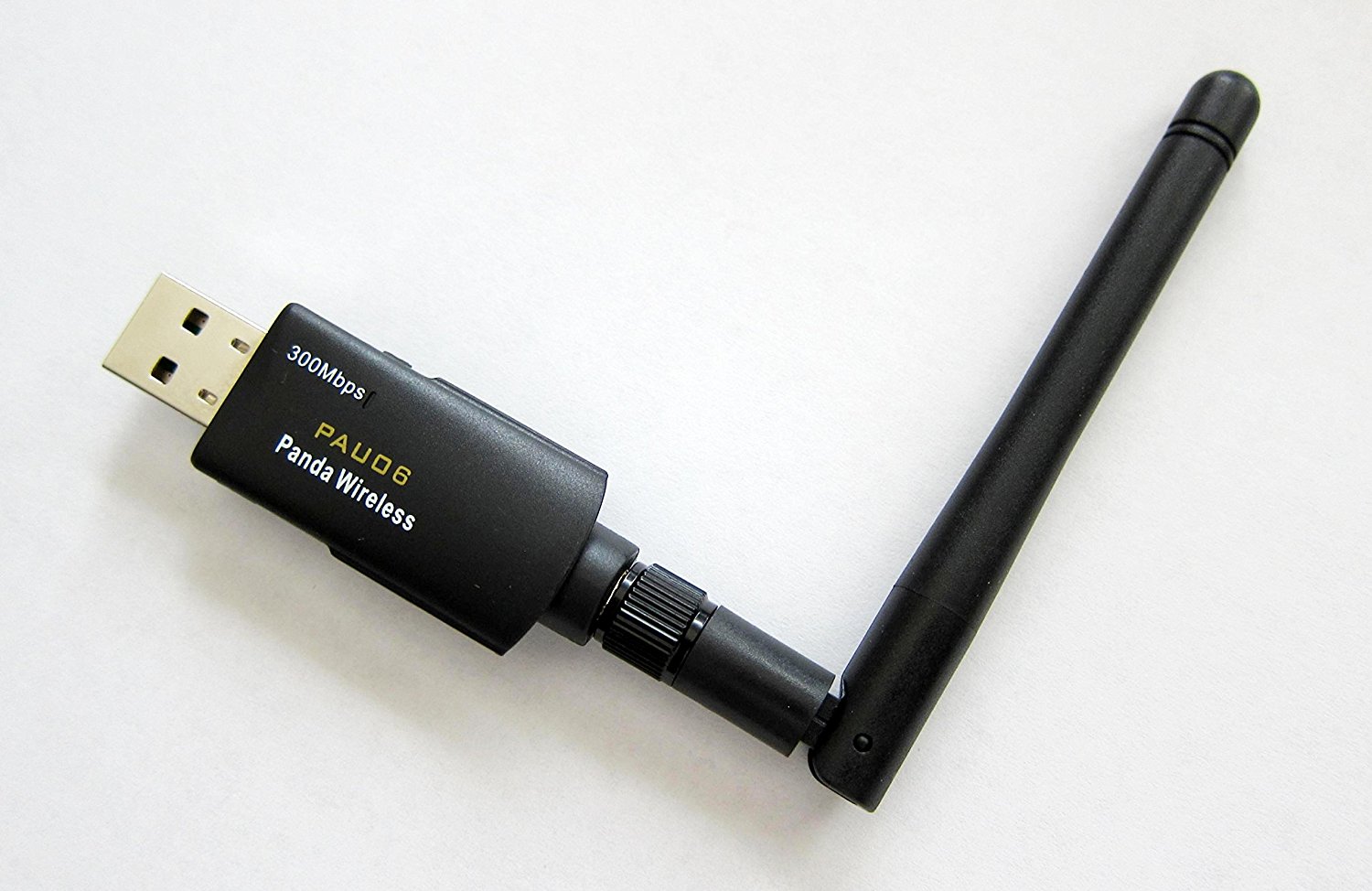
Potential Chipsets: RT5372
Potential Drivers: rt2800usb
148f:5372 Ralink Technology, Corp. RT5372 Wireless Adapter
This card (at least, the one that I received) uses a reasonably common chipset, and so a reasonably well supported Linux driver out of the box on Ubuntu 16.04.3.
It is relatively cheap, worked out of the box, and connected to my AP without issue. The chipset I received supports monitor mode, but it is very likely others who buy this card may not have a chipset that supports monitor mode. Compared to the other cards here, I would say the performance is very unreliable.
Just look at the wide range of download and upload speeds below. I re-ran these tests multiple times at different times of day (and overnight) and the speeds are very inconsistent in all test cases.
I have only seen one reported chipset for this device in my research, but as I warn multiple times, that is no guarantee that the card others receive will have the same chipset as mine.
Download Tests
0.0 - 3.3 Mbps | 38 +++++++++++
3.3 - 6.7 Mbps | 56 +++++++++++++++++
6.7 - 10.0 Mbps | 63 +++++++++++++++++++
10.0 - 13.3 Mbps | 92 ++++++++++++++++++++++++++++
13.3 - 16.7 Mbps | 90 ++++++++++++++++++++++++++++
16.7 - 20.0 Mbps | 96 ++++++++++++++++++++++++++++++
20.0 - 23.3 Mbps | 62 +++++++++++++++++++
23.3 - 26.7 Mbps | 33 ++++++++++
26.7 - 30.0 Mbps | 18 +++++
30.0 - 33.3 Mbps | 6 +
33.3 - 36.7 Mbps | 2
36.7 - 40.0 Mbps | 0
40.0 - 43.3 Mbps | 0
43.3 - 46.7 Mbps | 0
46.7 - 50.0 Mbps | 0
total: 556
max: 35.8563 Mbps
min: 1.14618 Mbps
average: 14.36 Mbps
Upload Tests
0.0 - 3.3 Mbps | 6
3.3 - 6.7 Mbps | 104 +++++++++
6.7 - 10.0 Mbps | 332 ++++++++++++++++++++++++++++++
10.0 - 13.3 Mbps | 111 ++++++++++
13.3 - 16.7 Mbps | 2
16.7 - 20.0 Mbps | 0
20.0 - 23.3 Mbps | 0
23.3 - 26.7 Mbps | 0
26.7 - 30.0 Mbps | 1
30.0 - 33.3 Mbps | 0
33.3 - 36.7 Mbps | 0
36.7 - 40.0 Mbps | 0
40.0 - 43.3 Mbps | 0
43.3 - 46.7 Mbps | 0
46.7 - 50.0 Mbps | 0
total: 556
max: 28.5147 Mbps
min: 2.09204 Mbps
average: 8.33 Mbps
PAU05 Cheap, But Less Reliable
Panda 300Mbps PAU05 Wireless N USB Adapter
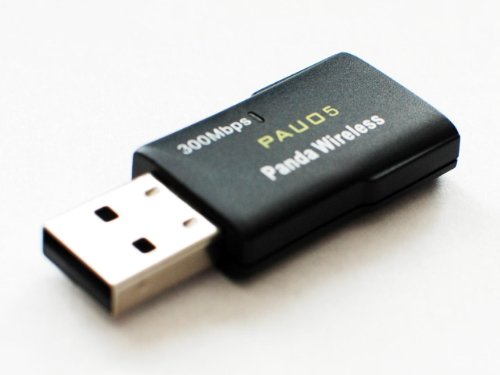
Potential Chipsets: RT3070, Atheros ?, RT2870, RT5732
Potential Drivers: rt2800usb
148f:5372 Ralink Technology, Corp. RT5372 Wireless Adapter
This card (at least, the one that I received) uses a reasonably common chipset, and so a reasonably well supported Linux driver out of the box on Ubuntu 16.04.3.
It is relatively cheap, worked out of the box, and connected to my AP without issue. The chipset I received supports monitor mode, but it is very likely others who buy this card may not have a chipset that supports monitor mode. Compared to the other cards here, I would say the performance is very unreliable.
Just look at the wide range of download and upload speeds below. I re-ran these tests multiple times at different times of day (and overnight) and the speeds are very inconsistent in all test cases.
I have seen multiple reported chipset for this device in my research, and as I warn multiple times, there is no guarantee that the card others receive will have the same chipset as mine.
Download Tests
0.0 - 3.3 Mbps | 16 +++++
3.3 - 6.7 Mbps | 46 +++++++++++++++
6.7 - 10.0 Mbps | 55 +++++++++++++++++
10.0 - 13.3 Mbps | 69 ++++++++++++++++++++++
13.3 - 16.7 Mbps | 92 ++++++++++++++++++++++++++++++
16.7 - 20.0 Mbps | 87 ++++++++++++++++++++++++++++
20.0 - 23.3 Mbps | 89 +++++++++++++++++++++++++++++
23.3 - 26.7 Mbps | 56 ++++++++++++++++++
26.7 - 30.0 Mbps | 26 ++++++++
30.0 - 33.3 Mbps | 19 ++++++
33.3 - 36.7 Mbps | 3
36.7 - 40.0 Mbps | 0
40.0 - 43.3 Mbps | 1
43.3 - 46.7 Mbps | 0
46.7 - 50.0 Mbps | 0
total: 559
max: 42.1666 Mbps
min: 1.33794 Mbps
average: 16.62 Mbps
Upload Tests
0.0 - 3.3 Mbps | 1
3.3 - 6.7 Mbps | 9
6.7 - 10.0 Mbps | 383 ++++++++++++++++++++++++++++++
10.0 - 13.3 Mbps | 164 ++++++++++++
13.3 - 16.7 Mbps | 2
16.7 - 20.0 Mbps | 0
20.0 - 23.3 Mbps | 0
23.3 - 26.7 Mbps | 0
26.7 - 30.0 Mbps | 0
30.0 - 33.3 Mbps | 0
33.3 - 36.7 Mbps | 0
36.7 - 40.0 Mbps | 0
40.0 - 43.3 Mbps | 0
43.3 - 46.7 Mbps | 0
46.7 - 50.0 Mbps | 0
total: 559
max: 15.1124 Mbps
min: 3.18209 Mbps
average: 9.40 Mbps